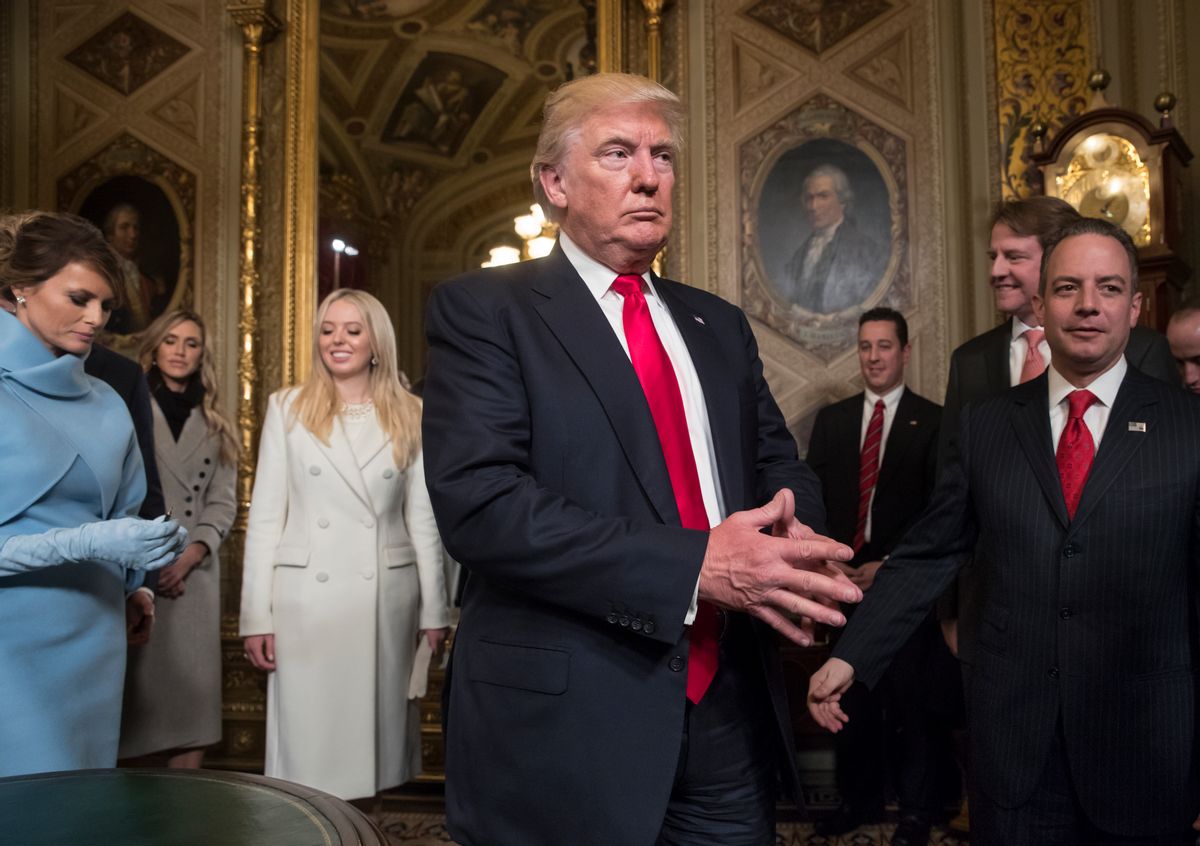WASHINGTON — President Donald Trump quickly assumed the mantle of the White House and began setting up his new administration on Friday, signing a bill that allows retired Gen. James Mattis to serve as his defense secretary, as well as the nomination papers for his other Cabinet choices.
Less than an hour after delivering a stinging rebuke of the political status quo in his inaugural address, Trump sat in an ornate room steps from the Senate floor to officially assemble his core team. Flanked by Vice President Mike Pence and congressional leaders, he praised each of his nominees as he signed the papers and handed out the pens he was using. He also engaged in banter with his new congressional rivals, including Senate Democratic leader Chuck Schumer of New York and House Democratic leader Nancy Pelosi of California.
Trump also signed a proclamation declaring a national day of patriotism, according to a tweet from White House spokesman Sean Spicer.
Although Trump campaigned on promises to get to work immediately, he has since backed off some of his promised speed, downplaying the importance of a rapid-fire approach to complex issues that may involve negotiations with Congress or foreign leaders. Trump has said that he expects Monday to be the first big workday, his effective Day One.
The bill passed by Congress last week granted Mattis a one-time exception from federal law barring former U.S. service members who have been out of uniform for less than seven years from holding the top Pentagon job. The restriction is meant to preserve civilian control of the military.
Mattis, 66, retired from the Marine Corps in 2013. He was confirmed by the Senate as Trump watched his inaugural parade from a stand outside the White House. The Senate later confirmed retired Gen. John Kelly to lead the Homeland Security Department.
While Trump participated in the rituals of the day that included the inaugural parade and balls, there were signs his new government was up and running. Federal websites and agencies immediately began reflecting the transfer of power, and WhiteHouse.gov was revamped for Trump's policy priorities as pages about LGBT rights and the Obama administration's climate change plan were eliminated.
But the Trump team kept a section of the website that let voters petition the White House. Two new petitions were posted Friday: one calling on him to release his tax returns and verify that he is not receiving payments from foreign governments, the other asking him to divest of his holdings or put them in a blind trust.
Shortly after Trump became president, the Department of Housing and Urban Development suspended the Obama administration's planned reduction of mortgage insurance premium rates, a move that had been intended to make buying a home more affordable.
At the signing ceremony at the Capitol, Pelosi jokingly objected to receiving a pen used to nominate Rep. Tom Price of Georgia to lead the Department of Health and Human Services. House Speaker Paul Ryan interjected, "I'll take it."
Trump has affirmed parts of the 18-point Day One plan he campaigned on, indicating that significant policy announcements may be teed up in the opening days of the Trump administration.
He still intends to withdraw from the 12-nation Trans-Pacific Partnership deal, which he views as detrimental to U.S. businesses and workers. He has also promised to renegotiate the two-decades-old Clinton era North American Free Trade Agreement or withdraw from it.
Given Trump's opposition to Obama's immigration actions, he could also cancel the Deferred Action for Childhood Arrivals program, or DACA, which has protected about 750,000 young immigrants from deportation. The program also offered those immigrants work permits.
Trump also faces an early choice of naming a Supreme Court justice to fill the vacancy left by the late Justice Antonin Scalia. Trump has said he will announce a nominee in about two weeks.
Other issues poised to receive early action include energy, where Trump is likely to undo regulations on oil drilling and coal, and cybersecurity, where he has already said he will ask for a report on the strength of the nation's cyber defenses within 90 days of taking office.



Shares